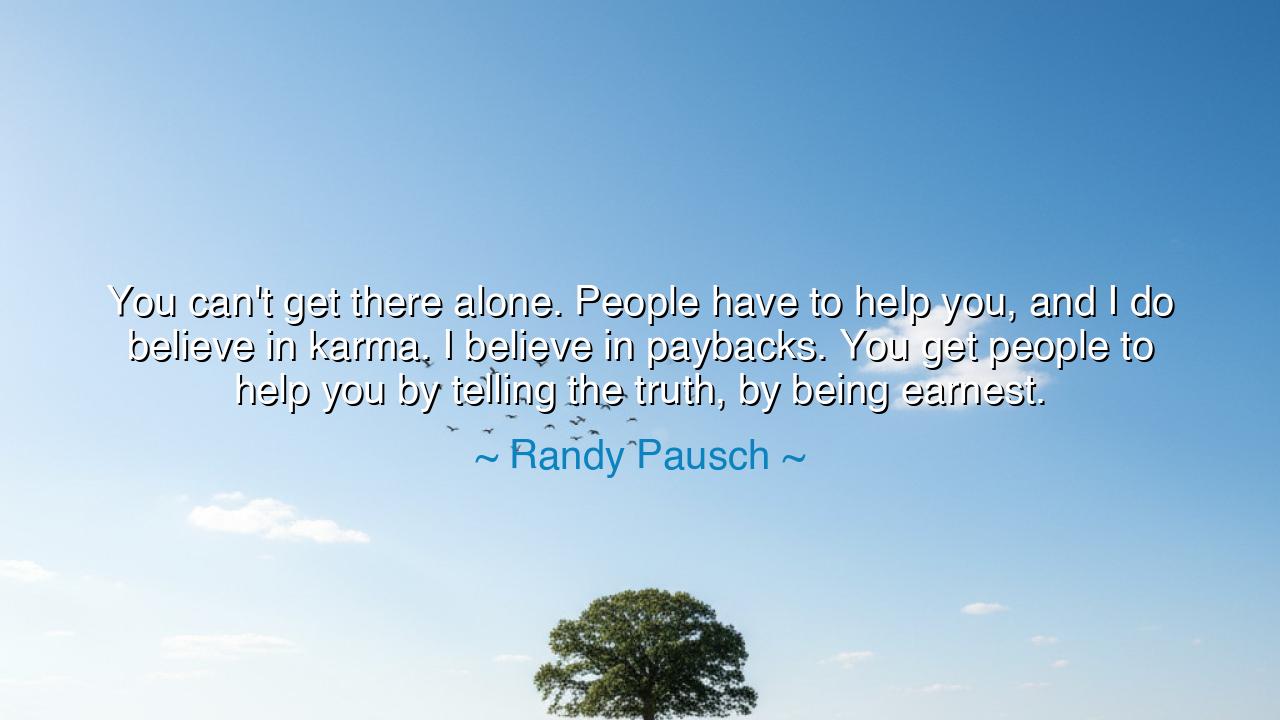
You can't get there alone. People have to help you, and I do
You can't get there alone. People have to help you, and I do believe in karma. I believe in paybacks. You get people to help you by telling the truth, by being earnest.






When Randy Pausch said, “You can’t get there alone. People have to help you, and I do believe in karma. I believe in paybacks. You get people to help you by telling the truth, by being earnest,” he was speaking not as a philosopher from a distant age, but as a man standing at the threshold between life and eternity. These words come from his famous Last Lecture, given as he faced his own death, yet filled not with despair, but with radiant wisdom and gratitude. In them, he gave the world a teaching that echoes through all generations: that no soul rises by its own strength alone. Every triumph, every dream fulfilled, stands upon the shoulders of others — and the only true way to honor that help is through honesty, humility, and sincerity of heart.
Pausch was a professor of computer science, a dreamer who believed in the boundless possibilities of human creativity. When he learned that his time on earth was short, he distilled a lifetime of lessons into one message for his students, his children, and all who would listen. In this quote, he reveals one of the great truths of the human journey: that interdependence, not independence, is the true foundation of success. He had seen in his own life that every step forward — every door opened, every dream realized — came not from ego, but from the kindness, faith, and guidance of others. We are, he reminds us, woven into one another’s stories; no one climbs the mountain alone.
The ancients, too, knew this truth. The philosopher Aristotle called man a zoon politikon — a creature made for community. Even the heroes of legend, for all their might, were never truly solitary. Odysseus would not have reached home without Athena’s counsel; Moses would not have led his people without the steady voice of Aaron. In every age, the strongest are those who accept help with gratitude, and who in turn offer it freely. Pride isolates, but truth and earnestness draw others near. Pausch’s words are the modern echo of that eternal law: that honor and authenticity are the currencies of friendship and the foundation of all great endeavors.
When Pausch speaks of karma, he does not mean it as a mystic superstition, but as the moral rhythm of life — the unseen symmetry between giving and receiving. Help begets help; truth begets trust; generosity plants seeds that bloom in ways unseen. The person who builds his life upon deceit or arrogance may rise quickly, but his foundation is sand. The one who builds upon truth and sincerity may move more slowly, but his roots reach deep. And when storms come — as they always do — it is the earnest soul, anchored in integrity, who endures. This is the karma Pausch believed in: not fate, but reciprocity — the quiet justice by which the universe honors honesty.
Consider the story of Abraham Lincoln, who rose from poverty to greatness not through cunning, but through authenticity. He was not the most polished or powerful man of his time, yet those around him trusted him because he spoke plainly, lived honestly, and worked tirelessly. Lincoln surrounded himself with rivals and critics — men of fierce ambition — and yet through humility and fairness, he turned them into allies. His strength was not isolation but inclusion. His life, like Pausch’s teaching, proves that truth and earnestness win loyalty where power and pretense cannot.
Pausch also teaches that help cannot be demanded; it must be earned through character. The world is filled with those who seek advantage, but people will only give their hearts, their time, and their faith to those who are real. To be earnest, in Pausch’s sense, is to show up with sincerity — to admit fault, to speak truth, to work with joy, and to care deeply about others. This kind of honesty does not shout; it shines. It attracts people not through charm, but through authenticity. The one who lives this way will find allies everywhere — for sincerity, once seen, calls forth sincerity in others.
So, my children, take this lesson into your own journey: you cannot get there alone. Do not cling to pride, for pride isolates and weakens. Instead, cultivate gratitude for every hand that lifts you, every voice that guides you, every kindness that opens a door. Return that kindness a hundredfold — not for reward, but for love of what is right. Tell the truth, even when it is hard. Work earnestly, even when no one watches. Help others, as others have helped you. For this is the sacred rhythm of life: as you give, so shall you receive; as you sow in honesty, so shall you reap in grace.
And when your own time comes — when you look back upon the path you have walked — may you, like Randy Pausch, look not with regret but with wonder. May you see not only your own footsteps, but the many that walked beside you, carrying you through the valleys and up the heights. Remember always: greatness is never solitary. It is born of community, sustained by love, and crowned with truth. Live earnestly, speak truthfully, and help others climb — for in lifting them, you rise yourself.






AAdministratorAdministrator
Welcome, honored guests. Please leave a comment, we will respond soon